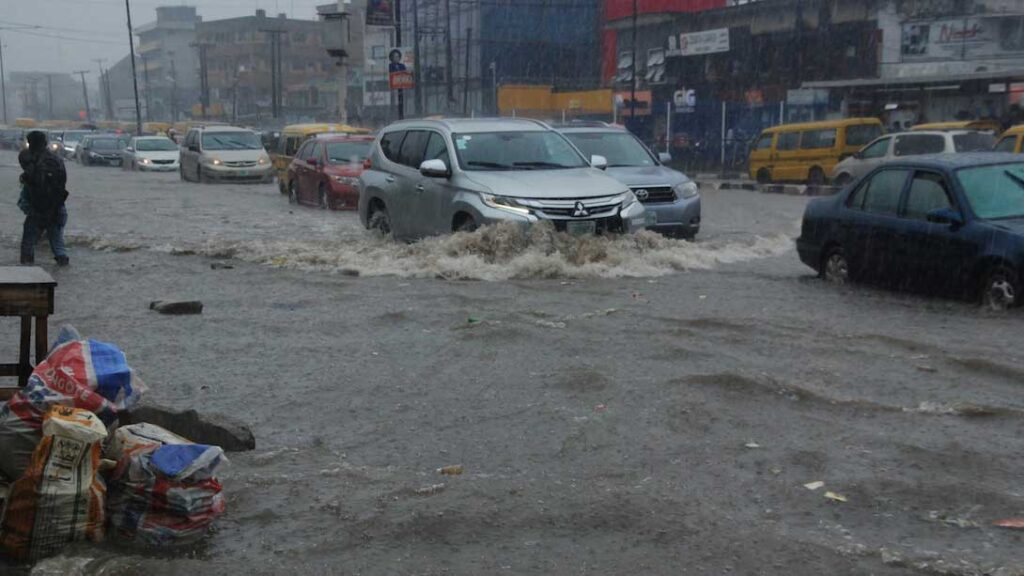
The dislocation of human and vehicular movement in parts of Lagos, following the torrential rainfall days ago, is not a good sign of things to come in the state, as the dry season gradually drags to an end. A clear fact is that drainage channels in the state are largely blocked; and if not quickly cleared, will impede water flow and cause flooding. Incidentally, flooding has been a perennial feature of the state yearly for reasons mainly attributable to low topography of the state; and partly to blocking of water drainage channels due to indiscriminate dumping of refuse into virtually any available space by unscrupulous inhabitants.
That the last rain flooded parts of Lagos State and brought movement and commercial activities to a stand-still did not come as a surprise given that over the years, the state government’s efforts to stem the recurrent flooding has been inadequate and at the same time sabotaged by careless dumping of refuse by citizens. It is therefore, imperative that Governor Babajide Sanwo-Olu and his team begin immediately to put in place measures to control flood and to protect Lagos as a coastal state. If flooding occurs, the people of Lagos will not be pacified by explanations that much of Lagos is below the sea level. Moreover, flooding in Lagos State, with its high population density, can occasion substantial damage to lives and property.
Some experts who ascribe the perennial flooding in the state to the low level of the terrain have also warned that the rate of the sinking of the state may actually cause it to disappear in 50 years. This warning should not be disregarded by government and its officials as the recent heavy rainfall caused flood that submerged 151 houses in Alimosho Local Government Area. Although there was no death recorded, the flood rendered thousands of people homeless and property worth millions of Naira destroyed. The flood was reported also to have affected several communities like Oke Ishagun, Isale Aboru, Ikola community, Olubodun Majiyagbe-Ajayi, Makinde Street, Olokowo Street and Adeola Street respectively in the area. It is likely that damages caused by the rain in some other areas went unreported or under-reported; and this is despite the short duration of the downpour which in most places was less than an hour. The worry is that the collateral damages could have been worse had the rain lasted longer.
Unfortunately, this is not the first time that massive flooding is being experienced in Lagos, including that part of the state. Flooding has in fact, become a frequent occurrence in Lagos anytime it rains despite all the assurances and awareness to stem the flood by government. Hence, most residents in Lagos have long settled into the regular flooding as their annual routine and lifestyle. The situation is not only pathetic but also unfortunate. It is pathetic because of the colossal loss of material resources and the displacement of people, especially women and children and it is unfortunate because it keeps happening every year and the situation is left to appear hopeless. Knowing that Lagos has always been flood-prone, it is pertinent to challenge the state government to do more to mitigate the annual flood risk associated with the state. Besides, the annual warning by government to people likely to be affected by flooding to relocate elsewhere goes to no issue given the non-provision of alternative places of abode to them. Yet, the number of people so usually affected runs into millions.
It is sad, therefore, that the situation in Lagos whenever it rains, has always been a cry of anguish and hopelessness by Lagosians. The flood paralysis that continue to afflict the city and the suffering that the people are enduring are not in no way justifiable in a sane society where government is alive to its responsibilities. The state government is in a position to ensure that circumstances such as this do not occur or should have been put under check in this age and time. It should be pointed out, however, that the Lagos state government has always been quick to respond to flooding incidents as the relevant agencies, including the state and National Emergency Management Agencies (NEMA), as well as the police are usually on ground to rescue citizens trapped in their cars or houses. In his account of the recent rescue operation, the South West Zonal Coordinator of NEMA, Ibrahim Farinloye said of the 151 houses affected, 23 houses were evacuated in Oke Ishagun community, 29 houses were affected in Ikola community, 15 houses in Olubodun Majiyagbe-Ajayi community, 12 houses at Makinde Street, 16 houses in Ojokowo Street and 21 houses in Adeola Street respectively.
No doubt, the need to salvage and protect communities from flooding is paramount; while the need to avert a flood prone disaster is urgent. Also, people in Lagos State should re-orientate themselves away from the bad habit of emptying their waste in drainages and block surface and underground drainage, thus defacing and destroying the environment. People should be educated enough to understand that industrial effluents and human and other municipal wastes produce a backlash of pollutants combining with the rains to overwhelm the drainage and the result is flooding.
Also, indiscriminate erection of structures on drainage channels, mostly in defiance of government’s directive, immensely contributes to the pressure of flooding. In all these, the state government bears primary responsibility of regulating society and charting the course of development and keeping the city’s drainage free from dirt. It is unfortunate that government has a penchant for simply drifting with the wind, for reacting rather than acting to avert avoidable flood disaster and for being part of the problem much of the time.
It is high time the Lagos State government stops pressing its luck, as a heavy rainfall will expose its inadequacy. It is urgent and indeed a duty for the government to invest in resources necessary today to ease the state from flooding problems. The time is now to engage experts to meet the environment challenges in order to avoid human tragedy before another heavy downpour occurs.













